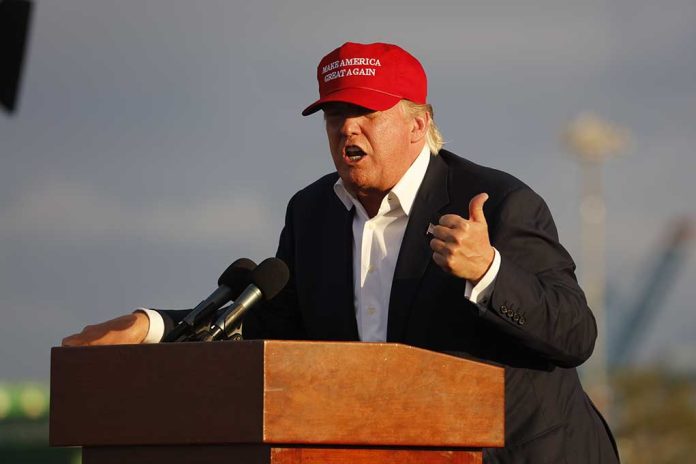
Senate votes to nullify Trump’s Canadian tariffs in rare bipartisan rebuke, but the resolution faces uncertain future in the Republican-controlled House and a likely presidential veto.
Top Takeaways
- The Senate passed a resolution to block President Trump’s tariffs on Canadian imports with a 51-48 vote, with four Republicans joining Democrats.
- The bipartisan effort, led by Senators Tim Kaine and Rand Paul, faces significant hurdles in the Republican-controlled House and a promised presidential veto.
- The resolution challenges Trump’s emergency declaration on fentanyl trafficking, which he used to justify the Canadian tariffs.
- The vote highlights growing Republican concerns about the economic impacts of Trump’s broader tariff agenda.
Senate Delivers Rare Rebuke on Tariff Policy
In a significant break with the White House, the Senate voted 51-48 to nullify President Trump’s tariffs on Canadian imports. The resolution, spearheaded by Democratic Senator Tim Kaine of Virginia and Republican Senator Rand Paul of Kentucky, received support from all Democrats and four Republican senators – Mitch McConnell, Susan Collins, Lisa Murkowski, and Paul himself. The vote represents a notable challenge to Trump’s trade policies, particularly his use of emergency powers to declare a crisis at the northern border as justification for imposing tariffs on Canada.
Senator Rand Paul emphasized America’s important relationship with its northern neighbor, stating, “We’re not at war with Canada. They’re an ally that buys more of our stuff than almost any other country in the world.” The resolution specifically targets Trump’s emergency declaration regarding fentanyl trafficking across the Canadian border, which critics argue is being used as a pretext for implementing broader tariff policies that could harm American consumers and businesses.
The tariffs that Trump detailed Wednesday mark the most significant U.S. protectionist trade action since the 1930s, when Congress imposed tariffs on more than 20,000 goods and dug the U.S. economy deeper into the Great Depression. https://t.co/G9863LOTQU
— Rand Paul (@RandPaul) April 3, 2025
McConnell’s Support Signals Republican Concerns
Former Senate Majority Leader Mitch McConnell’s decision to support the resolution marks a significant development. McConnell has consistently expressed concerns about tariffs’ economic impact, particularly on his home state of Kentucky. His vote signals growing Republican unease about the potential economic fallout from Trump’s trade policies. The resolution’s passage also highlights the limits of Republican unity on trade issues, with several key GOP senators publicly questioning the wisdom of tariffs on allies.
“As I have always warned, tariffs are bad policy, and trade wars with our partners hurt working people most. Tariffs drive up the cost of goods and services,” said McConnell in a statement.
While McConnell and three other Republicans broke ranks to support the resolution, most Senate Republicans remained aligned with the White House. Senate Majority Whip John Barrasso criticized the resolution, claiming it undermines Trump’s efforts to secure the border. This division within Republican ranks reflects broader tensions over the administration’s approach to trade policy and national security, with some embracing Trump’s aggressive stance while others worry about economic consequences.
Resolution Faces Uphill Battle
Despite passing the Senate, the resolution faces significant obstacles to becoming law. The House of Representatives, currently controlled by Republicans, is unlikely to take up the measure. Even if it were to pass both chambers, the White House has already indicated that President Trump would veto the resolution. Trump took to his social media platform Truth Social to criticize the effort, accusing Senator Kaine of trying to block tariffs on fentanyl and urging Republicans to oppose the measure.
Democrats plan to continue pressing the issue, with House Foreign Affairs ranking member Gregory Meeks announcing plans for a similar vote in the House. The resolution’s fate underscores the complex politics of trade policy, with both parties seeking to position themselves on issues affecting American workers and consumers. Many economists have warned that Trump’s broader tariff plans could lead to economic contraction, raising costs for businesses and consumers across multiple industries.
Economic Concerns Drive Opposition
Opposition to the tariffs centers on their potential economic impact. Critics argue that imposing tariffs on Canada, one of America’s largest trading partners, would increase costs for American consumers already struggling with inflation. Multiple industries have expressed concern about disruptions to supply chains and potential retaliation from Canada. Several Republican senators acknowledged these concerns but suggested the tariffs might serve as leverage in negotiations.
The vote comes as the White House has announced plans for broader tariffs targeting multiple international trading partners. While Canada has been temporarily spared from these additional measures, the administration’s overall trade strategy continues to generate debate. Some Republicans support the president’s efforts to reshape the economy through trade policy, while others worry about the impact on farmers, manufacturers, and consumers who could face higher prices and reduced export opportunities.






















